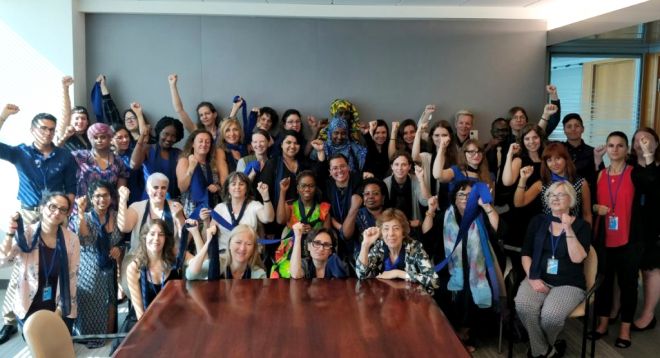Strengthening US Accountability: Reflections on the UN 2018 High-Level Political Forum
Published on September, 06 2018
Members of the Women’s Major Group wearing dark blue scarves to raise awareness about the need to protect and engage women’s human rights and environmental defenders. (Photo: WMG)
By Dawn Nelson
As an American, I am keenly interested in United States accountability both domestically and globally. The United Nations 2018 High-Level Political Forum (HLPF) on Sustainable Development provides one avenue for accountability under the Sustainable Development Agenda.
In July, I went to New York to be part of this year’s HLPF, which provided a review focusing on "transformation towards sustainable and resilient societies". In the process, 46 nations reviewed the progress towards the 2030 Agenda sustainable development goals (SDGs). Sustainable Development Goals on water (Goal 6), energy (Goal 7), cities (Goal 11), responsible consumption (Goal 12), forests (Goal 15), and partnerships/means of implementation (Goal 17) were analyzed by a variety of stakeholders.
Listening to countries highlight their progress on SDGs, several positive developments stood out. I was encouraged to hear several ministers discuss the pressing importance of peacebuilding if there is to be any measurable success of the 2030 Agenda. Many Member States also highlighted the need for inclusion and equality of women and girls, showing promise of national-level leadership on human rights, peace, and equality. It was heartening to see the voluntary local review contributed by New York City, the urban host of the HLPF at UN headquarters.
However, systematic barriers that prevent transformation still remained unchecked.
The extent of poverty in the US as detailed in a recent special UN report (that US Ambassador to the UN Nikki Haley has denied) was a reality left unaddressed. The US could easily have reported on SDG11 on the lack of affordable housing in cities across the nation, but there was not a word about it while millions of people continue to suffer in extreme poverty. With the United States pulling out of the Human Rights Council (see remarks by the President of the Human Rights Council about this withdrawal), denying American poverty exists, and contributing to numerous atrocities globally, it is clear we need to strengthen mechanisms for accountability.
As the timeline to 2030 dwindles, the impacts and perpetuation of a war economy (especially by many Security Council members) is not taken into consideration as a key obstacle. Sometime during the HLPF, I caught a headline that the US was calling for NATO allies to double military spending. Among numerous parallel discussions, the importance of moving away from military spending and channeling funds into public services to ensure human rights was barely addressed.
When these concerns were introduced at the HLPF, it was largely only due to active civil society engagement, especially by women. In the review session on SDG17, the representative of Women’s Major Group presented a group statement, which addressed the detrimental impact of current spending patterns around privatization, militarization and the arms trade, as well as conditionalities linked to funding provided by international financial institutions (IFIs), to the progress towards the realization of the 2030 Agenda. However, these calls often fell on deaf ears: some countries took issue with references to human rights, noting that there are other mechanisms and platforms to address such concerns.
Since the HLPF platform has yet to allow for independent civil society shadow reports (unlike the much stronger human rights procedures), we can only hope civil society contributions are taken into earnest consideration.
Leaving progress to the whimsy of moral appeals is not enough. Accountability is necessary for transformation to happen.
Will there be progress at least among those who stand in solidarity, or will the process lead to an erosion of political will?
I am hopeful that this year's outcome will serve to strengthen resolve and catalyze new leadership to emerge on the global stage.
Perhaps we will see some of this in 2019, when there is not only a review of SDG16 on peace, but also a review of the HLPF modalities under the auspices of ECOSOC in July and a second HLPF segment with heads of state at the General Assembly in September.
As we work to strengthen accountability both domestically and globally on women’s rights and peace, we must demand that the international community make political, not just technical, change that promotes a power shift away from patriarchy and toward feminist peace.
Ensuring the meaningful participation of civil society in the HLPF (as this WILPF review of the 2018 HLPF stresses), and supporting democratic spaces for the tenacious advocates who are leading the way for political change, will be essential moving forward.
If you are interested in this work, join WILPF's social media campaign: #WomenLead2030.
This article is a lightly edited version of Dawn Nelson’s July 28 blog post that appeared on the WILPF International website.



